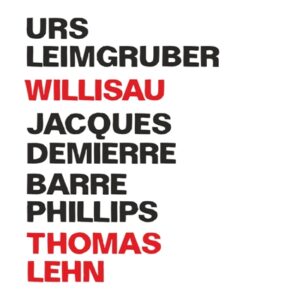CD jw 191 URS LEIMGRUBER – JACQUES DEMIERRE – BARRE PHILLIPS + THOMAS LEHN
WILLISAU
URS LEIMGRUBER soprano & tenor saxophones
JACQUES DEMIERRE piano
BARRE PHILLIPS double bass
THOMAS LEHN analogue synthesizer
DE
Das Abenteuer Improvisation wird einem selten so eindringlich vor Ohren geführt wie mit dem Trio LDP. Seit bald 20 Jahren sind die drei Instrumentalisten daran, ihre stupende Musik des Moments immer wieder anders und überraschend auf den Punkt zu bringen. Dabei stoßen sie in klangliche Gefilde vor, die sie oft selber überraschen. Das Trio hat an den einschlägigen Orten und Festivals weltweit seine Fans. Wer ihr Wirken seit Jahren verfolgt, ist erstaunt, wie sie mit ihrem endlosen Track immer wieder unsere Wahrnehmung schärfen. Mit dem Kontrabassisten Barre Phillips ist ein Musiker mit dabei, der schon vor über 50 Jahren das Publikum begeisterte. Im letzten Jahr ist das Trio an verschiedenen Residenzen in Europa mit illustren Gästen aufgetreten, hier haben sie mit Thomas Lehn einen Top-Musiker mit an Bord. Seine Analog-Elektronik fügt sich nahtlos in den puren Ausdruck dieses Trios. Pirmin Bossart
ENG
Stop playing but don’t stop the music, Henry Threadgill used to say, when he was directing a European version of the Dutch Instant Composers Pool where I shared the piano with Misha Mengelberg. Stop playing but don’t stop listening, has been the motto of the LDP trio since its creation. Listening as a statement, as a tour title, as the action of playing. Because we do not listen to something, we listen. We are in the act. We produce listening.
What is more, this happens in full confidence, since the Leimgruber-Demierre-Phillips trio has been – and still is, sharing the stage here with Thomas Lehn on synthesizer – an incredible space of trust and experimentation. A trust which has helped me to let emerge a certain mental state and emptiness at the moment of the immediate experience of sound in order to move towards a greater receptivity to what is happening, since trying to prompt this state would be in vain. It has also allowed for a kind of experimentation which, since the beginning, has emphasized the idea of responsibility rather than freedom. A kind of freedom where ‚free play‘ means above all letting others play whatever they want, and as a ‚minimal‘ position (recalling philosopher Ruwen Ogien’s notion of ‚minimal ethics‘), never play anything that could possibly hinder them.
No musician is entirely free in his sound production. He can, on the other hand, be entirely responsible in the way he takes charge of the continual acoustic effects which influence the ’sound body‘ resulting from the united presence of the musicians, from their playing and the place. To practice music with others is to navigate at the heart of a conjunction of transitory and acoustic circumstances where the experience of sound is at once the result and the origin of another experience of sound. Each musician is conditioned by the others, without however being fully dependent on them. His or her immediate experience of sound swings between dependence and autonomy, between cause and effect. Jacques Demierre
(excerpts from ABECEDAIRE ABC BOOK Jacques Demierre, Lenka lente, trans. Petya Ivanova)

